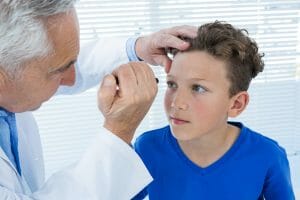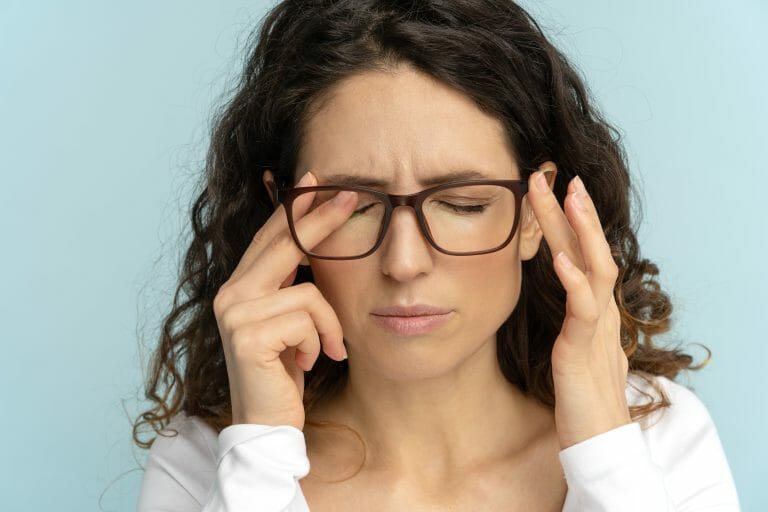What Is An Eye Twitch?
In medical terms, eye twitching is known as myokymia. Myokymia is uncontrollable eyelid spasms. Normally, your eye twitching issue only lasts for a few minutes, but on some occasions, eyelid twitch can persist for some days or even longer than that. You might think people around you see your eyelid twitch, but that is not the case most of the time, as eye twitches are subtle and are not seen by everyone with ease. If your eye continues to twitch and doesn’t go away, it may force you to squint or wink all day. In others, eye twitching does go away after some time and doesn’t come back. There can be many things that can cause twitching. Over-the-counter artificial tears can help to ease a minor twitch.
In eye twitch, there is an involuntary, repetitive spasm of your eye muscles. It may occur in both the lower and upper lids but mostly occurs in the upper eyelid. Some brain and nervous system disorders are developed due to twitching. Continuous twitching can develop benign essential blepharospasm. Benign essential blepharospasm is a very rare neurological disorder in which people experience an involuntary contraction of eye muscles and muscle spasms.
Many people experience these spasms as very gentle and mild and feel like a gentle tug on their lid. Some also experience spasms so strong that they force both eyelids to shut down completely. This condition is a different one known as blepharospasm. A spasm occurs every few seconds for one or two minutes. These spasms cause your eyelid closure that can cause a temporary inability to see anything. Spasms can also be the early warning indication of a chronic movement disorder. Twitching can also lead to many other serious conditions. Whenever a symptom of twitching is observed, you should take it seriously.
Possible Causes of Twitching
No one knows the major causes of eye twitching. But there are some possibilities that cause twitching. Some studies suggest that Bell’s palsy can be the reason for eye twitching. Some other possible reasons for eye twitching are as follows:
Allergies
People suffering from eye allergies can cause watery, itching, and swelling. Eye irritation can also cause twitch. These allergies cause you to rub your eyes, releasing histamine into your tear film and eyelid tissues, which causes eye twitches.
Treatment
Over-the-counter eye drops formulated to lessen allergy symptoms are very helpful, but one of their side effects is antihistamines, which can result in dry eyes. If you experience eye twitching and allergy symptoms, the best thing to do in such cases is to consult your eye doctor to ensure you are doing the ideal thing for the eyes.
Stress
Eye stress is most likely the ultimate common cause of eye twitching.
Treatment
Breathing exercises, getting more downtime into your schedule, spending time with friends or pets, and yoga are some of the tricks to lessen your eye stress.
Nutrition Issues
Many reports have shown that if nutritional ingredients such as magnesium are missing from your diet, it can result in the triggering of eyelid spasms. The reports are not conclusive; still, this can be a cause of eye twitch problem.
Treatment
Try to add all the necessary nutrients to your diet for a healthy vision. You can meet your eye doctor to discuss your diet and the ingredients that are missing. You can also try over-the-counter nutritional supplements to compensate for the nutrients that you lack.
Alcohol
Excessive alcohol consumption can also result in eye twitching.
Treatment
Take a break from consuming liquor, beer, or wine to reduce eyelid twitching. This breakage of alcohol consumption is a crucial step in taking care of your eyes.
Eye Fatigue
Either due to stress or any other reason, lack of sleep can also trigger eye twitching. Air pollution, bright light, or wind can also cause fatigue.
Treatment
Follow a consistent sleep schedule and get proper sleep to lower your eye stress fatigue.
Dry Eyes
Grownups suffer from dry eyes, specifically those who are of age more than 50. This issue is very common among those who wear contact eye lenses, sit in front of digital screens, consume alcohol, caffeine and take different medications such as antidepressants and antihistamines.
antidepressants and antihistamines.
Treatment
If you feel your eyes are dry or gritty and your eyelid twitches, fix an appointment with good doctors for an eye exam or evaluation. Keep your eye surface moisturized to stop eye twitching and reduce the risk of twitching eyelid ever again.
Caffeine
Individuals who have a great intake of caffeine can also trigger eye twitching.
Treatment
Decrease your soft drinks, coffee, and tea intake for one or two weeks and see how your eye twitching is gone forever. You can also switch to decaffeinated drinks if you cannot leave beverages.
Eye Strain
Eye strain is also caused mostly by the extra usage of smartphones, computers, and tablets. Due to this eye strain, you can experience eye twitching.
Treatment
The best way to reduce your eye strain is by following the “20-20-20” rule whenever you are using digital devices. The rule is that after every 20 minutes, move your eyes away from the white screen and see any object at least 20 feet away to let them focus on that object for at least 20 seconds. This will help you decrease the triggering of eye twitching. You may also contact your eye doctor to wear computer eyeglasses to relieve eye strain. So, take care of your eyes by taking these suggested steps.
Can Botox Injections Stop My Eye Twitching?
Botox (botulinum toxin) injections are used to do treatment of persistent eyelid twitches and facial spasms. These injections stop the involuntary muscle contraction in the lid that causes the eye twitching. Botulinum toxin is infected in a small amount in the muscles surrounding your eyes to relieve eyelid spasm.
See Your Eye Doctor
 If both of your eyelids clamp down so tight that it completely closes your eyes, you experience sudden changes in movement or appearance of half the face, you should immediately visit your eye doctor. These signs and symptoms indicate that your condition is serious. If still the eye twitching isn’t gone, this means that a serious neurological condition is affecting your eyelid, such as hemifacial spasm. This relatively rare condition is more severe and obvious than common eye twitching and should be evaluated immediately by your eye doctor. Hemifacial is treated with a neurosurgical procedure. If left untreated, twitching can lead to many other serious conditions.
If both of your eyelids clamp down so tight that it completely closes your eyes, you experience sudden changes in movement or appearance of half the face, you should immediately visit your eye doctor. These signs and symptoms indicate that your condition is serious. If still the eye twitching isn’t gone, this means that a serious neurological condition is affecting your eyelid, such as hemifacial spasm. This relatively rare condition is more severe and obvious than common eye twitching and should be evaluated immediately by your eye doctor. Hemifacial is treated with a neurosurgical procedure. If left untreated, twitching can lead to many other serious conditions.



